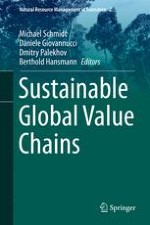Abstract
This chapter will discuss the bread supply chain in countries facing the challenges of food security and sustainable development. The focus will be on the Middle East and North Africa (known as the MENA region). In this area, wheat is a dietary staple, making it a powerful tool for governmental food security policies. Based on the International Food Policy Research Institute (IFPRI), this region includes: Algeria, Bahrain, Djibouti, Egypt, Iran, Iraq, Jordan, Kuwait, Lebanon, Libya, Malta, Morocco, Oman, Qatar, Saudi Arabia, Sudan, Syria, Tunisia, the United Arab Emirates, the West Bank and Gaza, and Yemen. This region is the world’s most dependent on food imports, and its countries are among the world’s largest importers of wheat (Breisinger et al. 2010). Additionally, its population almost tripled in 50 years, and its freshwater and arable lands are diminishing, becoming more vulnerable to climate change. Some countries in this region have recently witnessed a series of political changes, ranging from peaceful demonstrations to civil wars; the so-called Arab Spring, political instability, and terrorism severely affected this region’s economies (Ianchovichina et al. 2015). Some countries, like Syria, Yemen, Libya and Iraq, are still affected by conflicts, which are considered the main drivers of food insecurity (FAO 2015). Other countries, such as Egypt, the most populated country in the region, overcame these conflicts and have started to recover. Before the uprising, Egypt’s food security had been maintained since 1956 thanks to its food and energy subsidy programme. After the uprising, however, Egypt was urged out of necessity to adopt a new development model that could deal with contemporary challenges and restore security. As a result, the new regime introduced an agenda for sustainable development known as the Sustainable Development Strategy: Egypt Vision 2030 (SDS 2030). When discussing food security in Egypt, wheat is the backbone of the food system, representing 51% of the total daily caloric intake. Therefore, a secure and stable wheat/bread supply chain is essential to maintain food security, which has forced some governments to exercise control over the supply chain. With this view, this chapter has the following objectives:
